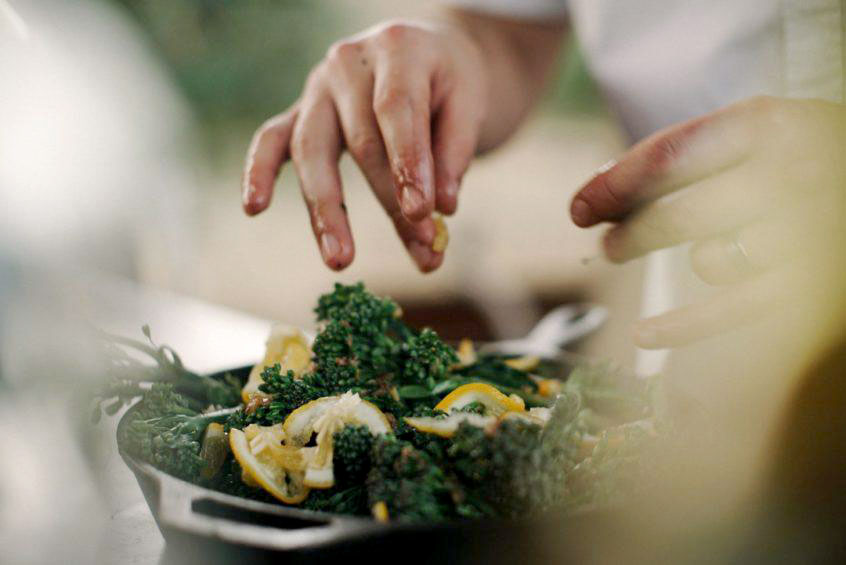Are you sick of cooking yet?
Even for those of us that were already in a regular food prep and cooking routine, this is a whole new level. I don’t know about you, but I didn’t realize how much I relied on grabbing a salad on-the-go or popping into Whole Foods to pick up dinner from the hot bar until those options disappeared.
Of course, with less running around (OK, no running around) and reduced access to restaurants and prepared grocery food, I’m prepping, cooking and relying on different resources to keep my family fed with healthy and affordable options.
I guess I’m not alone because my good friend and local business owner, Lee Carson of Hyatt Training, posted this helpful guide on her blog today. It was great to have a shopping list and recipes that I didn’t have to create. Thanks, Lee!
More helpful hints and resources
Like Lee, I’m making a weekly shopping list and menu. I don’t want to visit the grocery store any more than is necessary. My goal is easy breakfast options like chia pudding, paleo granola with cashew yogurt or mixed veggies and turkey sausage and leftovers for lunch. As for dinner, I’m working on meals that take 20 minutes or less.
I’ve also enlisted the help of Kristin Koziara of Seasoned Chef.
Each week, Kristin offers a variety of delicious meals, a la carte items, and even smoothie and salad kits. I strategically use her locally-sourced creations for a few dinners each week to reduce my time in the kitchen. Every Wednesday when she drops my meals at my door, I get a much-appreciated mental break from thinking about dinner.
In light of the recent crisis, she is also offering grocery delivery! If you would like to receive her weekly menu, contact her and asked to be added to her weekly email list. By ordering from Kristin, you’re supporting a local small business owner and saving time!
For quick meals, I’ve been using Daily Harvest for organic bowls and smoothies. While I’m not vegan, I love basing many of my meals on vegetables. These bowls are pre-prepped and frozen and take 5 minutes or less to warm up!
More “food” for thought
Maintaining your resilience and health at this time is more important than ever. We know that those with pre-existing medical conditions are at a higher risk of becoming very ill with COVID-19.
Proactively using food as medicine is one of the best ways to support your immune function, optimize sleep, boost energy, and reduce inflammation. All of these improvements build a better foundation for short-term health and longevity. Here are some things you can do:
1. Balance blood sugar by cutting refined carbs (pasta, sweets, bread, crackers. etc.). Get your carbs from veggies like squash, sweet potatoes and root veggies, legumes or ancient grains like buckwheat or millet. Try fruit for dessert or my favorite sugar substitute, Monk fruit, to sweeten plain cashew yogurt or tea. Every time your blood sugar swings high or low, inflammation increases. If you suffer fatigue after eating, you may have a blood sugar imbalance.
2. Remove inflammatory foods which can be done with an in-depth food sensitivity testing for individualized results or by eliminating the most common inflammatory foods including gluten, dairy, egg, soy, and corn. For many people, removing these “big ticket items” yields almost immediate reduction in inflammatory symptoms like pain, skin conditions, GI upset and more. If you suffer from inflammatory symptoms, consider food sensitivity testing.
3. Increase plants like vegetables, fruit, nuts, and seeds. Alongside an increase in micronutrients and antioxidants, you will enjoy the benefits of more fiber and water to flush toxins. Make sure to consume many colors of produce to diversify your micronutrients.
4. Stop eating 4 hours before bed. By letting your body finish digestion before bedtime, you give your system a better chance at deep sleep. If you struggle to avoid snacking, chew gum or drink peppermint tea as a replacement.
Food truly is medicine
We can use it as preventative medicine, and we can use it as treatment in many circumstances. In my opinion though, it’s a lot easier to prevent than to treat. Stay well!
About Megan Barnett, MS
 Megan Barnett is a functional medicine practitioner in Portland, Oregon. In her clinical practice, she helps patients identify the root cause of their health problems, then designs individualized and evidence-based approaches to alleviate symptoms and help their bodies heal. She has a Bachelor of Science in Dietetics from Kansas State University and a Master of Science in Nutrition and Functional Medicine from University of Western States.
Megan Barnett is a functional medicine practitioner in Portland, Oregon. In her clinical practice, she helps patients identify the root cause of their health problems, then designs individualized and evidence-based approaches to alleviate symptoms and help their bodies heal. She has a Bachelor of Science in Dietetics from Kansas State University and a Master of Science in Nutrition and Functional Medicine from University of Western States.

